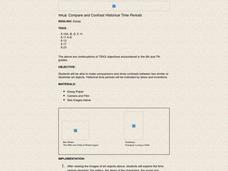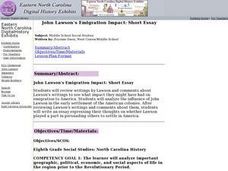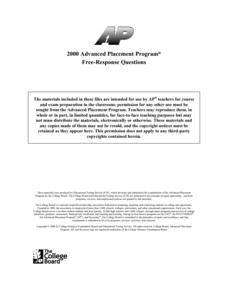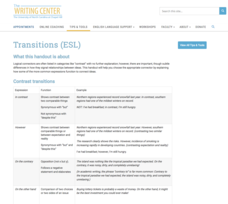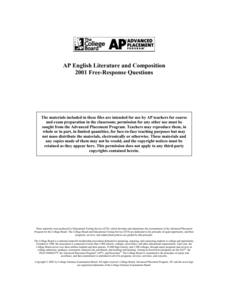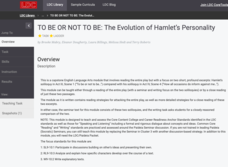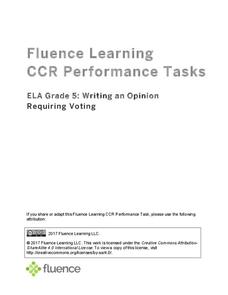Curated OER
COMPARE AND CONTRAST HISTORICAL TIME PERIODS
Students make comparisons and show contrasts between two similar or dissimilar art objects. Historical time periods will be indicated by dress and inventions.
Curated OER
Essay Writing
Students complete essay writing activities. In this essay writing lesson, students use an outline activity to learn about the advantages and disadvantages for various essay writing types. Students also break down the paragraphs into...
Curated OER
John Lawson's Emigration Impact: Short Essay
Students review John Lawson's writings to discover the impact they had on emigration to America. Using the writings, they analyze the influence of them and review the early settlement of the colonies. They write their own essay sharing...
Maryland Department of Education
The Concept of Diversity in World Literature Lesson 8: Nonfiction Close Reading
As part of their study of Things Fall Apart, class members conduct a close reading of a section of Chinua Achebe's essay, "An Image of Africa: Racism in Conrad's Heart of Darkness." Jigsaw groups then compare the voice in the essay...
Maryland Department of Education
The Concept of Diversity in World Literature Lesson 1: Unit Introduction
To launch a unit study of the concept of diversity in World Literature, class members compare Chinua Achebe's essay, "An Image of Africa: Racism in Conrad's Heart of Darkness" and Richard Rodriguez's essay, "The Chinese in All of Us: A...
Curated OER
Survival of Native American Culture
Students research the five tribes of the Iroquois Nation focusing on housing, food, clothing, transportation, religion, and language. They research using Internet sources and book mark sites for reuse.
College Board
2000 AP® English Literature and Composition Free-Response Questions
Everyone enjoys a good mystery. Learners create essays explaining how a mystery gives meaning to a novel or play of their choice. They also examine the use of literary elements of diary entries in The Spectator. A third essay question...
Fluence Learning
Writing About Informational Text: Political Parties
To demonstrate their ability to craft an analysis of informational text, class members read excerpts from James Madison's "The Federalist No. 10," from George Washington's Farewell Address, and from Thomas Jefferson's First Inaugural...
University of North Carolina
Transitions (ESL)
When it comes to comparing and contrasting in an essay, looking at a chart and picking a random transition word may not do the trick. As explained in an informational writing handout, the words writers use to move from one idea to...
West Virginia Department of Education
Declarations and the Quest for Life, Liberty and the Pursuit of Happiness
Understanding how John Brown got his inspiration from the Declaration of Independence helps learners further understand both West Virginia and United States history. The resource, a standalone, uses worksheets, discussion, and essay...
Orlando Shakes
Shakespeare in Love: Study Guide
What word has two syllables and means a ray of moonlight? If young readers guessed moonbeam, they are correct! With the Shakespeare in Love study guide, participants test their guessing skills in an exciting game of Shakespeare Taboo...
Literacy Design Collaborative
Exploring Character Development in The Watsons Go to Birmingham - 1963
How did the Civil Rights Movement affect young people in the United States? Scholars read Christopher Paul Curtis' novel, The Watsons go to Birmingham - 1963. Next, they write compare and contrast essays showing how the main characters...
Maryland Department of Education
The Concept of Diversity in World Literature Lesson 10: Author's Purpose Seminar
Why did Chinua Achebe write "An Image of Africa: Racism in Conrad's Heart of Darkness" in response to Conrad's novel? As part of a study of Things Fall Apart, class members conduct a socratic seminar focused on Achebe's purpose and...
College Board
2007 AP® English Literature and Composition Free-Response Questions
Scholars use the 2007 AP® English Literature and Composition Free-Response Questions to write essays examining how a character's tie to the past affects the story. The resource also requires pupils to write essays comparing two related...
College Board
2008 AP® English Literature and Composition Free-Response Questions
Scholars are challenged to create essays comparing two poems in which the authors discuss fears and concerns about dying and life passing by too quickly. Two other essay questions ask writers to analyze literary elements and characters...
EngageNY
End of Unit 2 Assessment, Part 1b: Writing Introduction and Conclusion
Writers continue looking at the rubric for their A Long Walk to Water essays. This time, they analyze the demands for the introduction and conclusion paragraphs. Pupils compare the rubric to the opening and closing of the model essay,...
Huntington Library
Religion & Spirituality - Exploring the California Missions
The California missions were built with the hope of converting the local Native Americans to Catholicism, but exactly how different were their beliefs to begin with? Through analysis of a series of primary source documents, young...
Virginia Department of Education
Adaptation and Evolution
Um may be the atomic symbol for confusion, but it won't be needed in this lesson. Scholars rotate through seven stations completing experiments, hands-on activities, writing exercises, and analysis. Stations include material on...
EngageNY
Grade 10 ELA Module 2: Unit 1, Lesson 19
Great minds think alike. Scholars read two texts and compare how the authors develop the same central idea. Readers analyze "Women" by Alice Walker and "Letter from Birmingham Jail" by Martin Luther King Jr. They discuss word use and new...
College Board
2001 AP® English Literature and Composition Free-Response Questions
Do 100 years make a difference? Scholars compare two poems written 100 years apart. They also analyze characterization used in a passage from Tom Jones by Henry Fielding. A final essay question allows writers to choose a piece of work...
Literacy Design Collaborative
To Be or Not to Be: The Evolution of Hamlet’s Personality
How does Hamlet's state of mind change over the course of Shakespeare's most famous revenge tragedy? After a close reading of Hamlet's soliloquies in Act III, scene 1 and Act IV, scene iv, class members engage in a Paideia/Socratic...
Maryland Department of Education
The Concept of Identity Lesson 7: Logical Fallacies
What are the effects of competition in an academic environment? The competition between the main characters in A Separate Peace motivates a series of activities that asks readers to take a stance on competition, and then to develop a...
Fluence Learning
Writing an Opinion Requiring Voting
Challenge writers to compose an essay detailing their stance on, and the history of, voting. Three assignments, each broken down into three parts, requires fifth graders to take notes, read and complete charts, write paragraphs, compare...
National Science Teachers Association
Hop into Action
Young scientists find out what makes amphibians such unique and interesting animals in this simple life science activity. After looking at pictures and discussing the characteristics of amphibians, learners complete a series of three...
Other popular searches
- Comparative Essay Writing
- Comparative Essay Template
- Writing a Comparative Essay
- Comparative Essay Samples
- Comparative Essay Plans
- Wrting Comparative Essay
- Comparative Essay Myths
- Writing Comparative Essays


